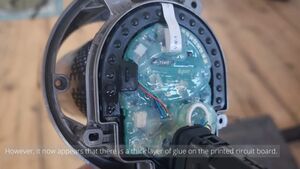Dyson
❗Article Status Notice: This Article is a stub
This article is underdeveloped, and needs additional work to meet the wiki's Content Guidelines and be in line with our Mission Statement for comprehensive coverage of consumer protection issues. Issues may include:
- This article needs to be expanded to provide meaningful information
- This article requires additional verifiable evidence to demonstrate systemic impact
- More documentation is needed to establish how this reflects broader consumer protection concerns
- The connection between individual incidents and company-wide practices needs to be better established
- The article is simply too short, and lacks sufficient content
How You Can Help:
- Add documented examples with verifiable sources
- Provide evidence of similar incidents affecting other consumers
- Include relevant company policies or communications that demonstrate systemic practices
- Link to credible reporting that covers these issues
- Flesh out the article with relevant information
This notice will be removed once the article is sufficiently developed. Once you believe the article is ready to have its notice removed, visit the Discord (join here) and post to the #appeals channel, or mention its status on the article's talk page.
❗Article Status Notice: Unacceptable Tone/Word Usage
This article needs additional work to meet the wiki's Content Guidelines and be in line with our Mission Statement for comprehensive coverage of consumer protection issues. Specifically it uses wording throughout that is non-compliant with the Editorial guidelines of this wiki.
How You Can Help:
If this is a non-Theme article:
- Persuasive language should not be used in the Wiki's voice. Avoid loaded words, or the causing of unnecessary offense, wherever possible.
- No direct attacks on named individuals or companies. Malice may be attributed to bad and proven offenders, but only through the use of quotation and citation - never in the Wiki's voice.
If this is a Theme article:
- Where argumentation is used make sure it is clear and direct but not inflammatory. Avoid strong language, or causing unnecessary offense.
- No direct attacks on named individuals or companies. Malice may be attributed to bad and proven offenders, in a formal and calm manner.
This notice will be removed once sufficient documentation has been added to establish the systemic nature of these issues. Once you believe the article is ready to have its notice removed, visit the Discord (join here) and post to the #appeals channel.
Dyson, founded in 1991, is a manufacturer of home appliances such as vacuum cleaners, and has been found to be using anti-repair practices which have stirred controversy.
Harder to repair buttons

There have been reports of vacuum trigger button being harder to self-repair for a consumer due to the use of glue on the PCB, prompting the user to replace the whole housing.[1][2]
List of controversies and practices
Dyson intentionally reduces battery lifespan and makes them difficult to repair
